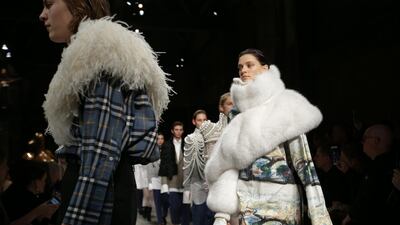Monthly magazine Elle has banned the use of fur in all of its global titles.
The fashion and lifestyle magazine, which has 45 editions across the world, will no longer feature fur in any photoshoots, product placements or runway galleries in its print and digital media.
"The presence of animal fur in our pages and on our digital media is no longer in line with our values, nor our readers,” said Valeria Bessolo LLopiz, Elle's senior vice president and international director.
“It is time for Elle to make a statement … rejecting animal cruelty,” Bessolo Llopiz said at the Business of Fashion Voices 2021 event in Oxfordshire in England on Thursday.
Hailing a "fur-free future", Bessolo LLopiz told Reuters: "It's a really great opportunity to increase awareness for animal welfare, bolster the demand for sustainable and innovative alternatives and foster a more humane fashion industry."

The women's magazine originated in France in 1945 and is owned by French media group Lagardere. It has an estimated 33 million readers and 100 million monthly online visitors.
Thirteen editions of Elle have already implemented a charter to ban fur and another 20 will join this group from January 1. The remaining 12 editions will ditch fur from January 1, 2023.
The magazine is the first major publisher to mandate a fur ban, a trend that is becoming more common in the world of fashion and retail.
Gucci and Michael Kors publicly vowed to go fur-free in 2018, when Gucci auctioned off its existing fur stock and donated the proceeds to animal welfare groups.
In September this year, luxury group Kering announced all of its brands would join Gucci in the move. Italian fashion powerhouse Prada has also been fur free since 2020 and Burberry ditched the animal cruelty in 2018.
The moves are a big jump from Karl Legerfeld's statement in 2009, when the designer behind high-end fashion houses Fendi and Chanel, famously declared that in a culture of meat-eating and leather use, “the discussion of fur is childish”.
As more consumers align with ethical and environmental values, fashion houses, designers, retailers and now media are having to rethink their reliance on animal products.


